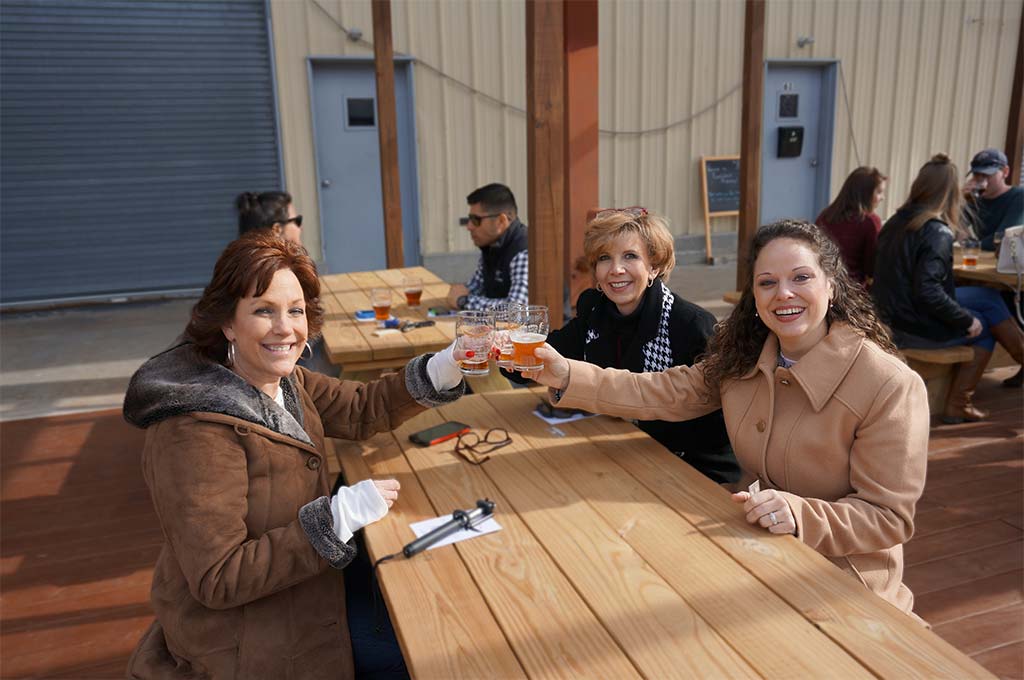SB 85 Passes and the Future of Georgia Beer
Georgia brewers and imbibers are celebrating a long-awaited victory in legislative progression! The last state in America to prohibit its brewers from selling their own products on-premise is now opening the door for just that. SB 85 Malt Beverages; provide for limited sale at retail by manufacturers, a bill jointly presented by the Georgia Craft Brewers Guild and Georgia Beer Wholesalers Association to the Georgia General Assembly, proposed that the state allow breweries to sell beer for on-site and off-site consumption, to be limited to 3,000 bbls per year per brewery. That bill passed quickly, and with ease, this past week and now awaits its implementation this summer and any interpretations by the Georgia Department of Revenue. To fully appreciate this, let’s take a step back and recap how all this developed.
Georgia Beer Day
January 28, 2017 was Georgia Beer Day. A lot of state brewers held small events at their locations in order to raise money for the Georgia Craft Brewers Guild (GCBG). Many of you, especially those who may have moved here from other states or who haven’t yet visited your local brewers, may not understand why GCBG needs to raise money nor what their purpose is with that money. In short, Georgia has some interesting beer laws and how we as consumers react to these laws is what will dictate how they can be changed if they can be changed at all. The changing of these laws is essential to the future of craft beer in Georgia and we, as consumers, and beer lovers must become part of the solution if we want to better support the industry and people who make the beers we wish to enjoy.

Three-tier system, prohibition and the future
My father once explained to me that “strategy” is identifying where you are currently, understanding where you want to be in the future, and then coming up with the steps to get to that future. In order to even envision the future of Georgia beer, we should first know where we are and how we got here. Before prohibition, many local brewers would have ownership ties to the establishments that sold their products. These ties normally came in various forms to include providing equipment and supplies to even, in some cases, incentives for not carrying rival breweries’ products. This system, known as “tied-houses” led to much abuse and, in some cases, the well-being of customers was second to the acquisition of profits.
Where are we starting from?
The abuses were one of the many reasons cited to enact prohibition in 1919 through the 18th Amendment to the U.S. Constitution. In 1933, the 21st Amendment would repeal prohibition and turn over the authority of all alcohol-related governance to the States. A new regulatory system known as the “Three-Tier System” was created in order to eliminate the abuses of previous methods and protect consumers. Tier 1 consisted of importers and producers of alcohol such as breweries who could only sell to tier 2 wholesalers who can then distribute to tier 3 retailers such as bars or stores. Many states understanding the craft beer movement and wanting to encourage small business have looked at and revised the system to ensure consumers are still protected but also to encourage small business growth among small brewers and distillers. Georgia, on the other hand, is in an interesting position. Unlike many other states, small breweries cannot self-distribute and cannot sell directly to consumers in tasting rooms at their breweries. Georgia brewers are also locked into lifetime contracts with a distributor. Many breweries have no recourse against their distributors if a dispute arises. As such, the distributors seemingly hold a position of strength over the industry with no real force to balance the playing field.

Two year’s ago, Georgia passed a similar bill, SB 63, which functioned as a middle step between where we are now and the more free and logical systems in place in many other states around the country. It would allow breweries to sell a tour to a consumer and then give away samples as souvenirs. The regulation of this new bill was placed into the purview of the state Department of Revenue. In a bold move, the Department of Revenue put out a bulletin on September 25th 2016 that severely restricted the breweries ability to control the pricing of their tours months after the bill had passed and many brewers had already hired staff and built up tour facilities. According to the Atlanta Journal-Constitution the “Georgia Beer Wholesales Association, which had fought with the brewers for years to preserve rules that prevent beer makers from selling their product directly to consumers, had advance notice that the Revenue Department was working on the new regulation and had plenty of access with agency officials beforehand.” In other words, the tier 2 wholesale distributors used their political lobby arm in an effort to maintain the status quo. A fellow PorchDrinker got to talk with Nathan Cowan, CEO of Eventide Brewing, who commented on the hurdles many Georgia breweries face in the open market.
Cowan explained, “The market is there. If you want to go out and buy craft beer, you do. So, of course, someone’s going to fill that niche. The issue that we have isn’t that it’s hard to make beer here in Georgia, it’s just that we get so much pressure from other states. For instance, our distributor just picked up a brewery from Alabama, and that brewery has probably been growing ten times faster than we have because they are so much more flexible in being able to get their beer to market.”

Where do we see ourselves going?
The future of Georgia beer could be very bright. Many state brewers are seeing the proverbial light at the end of the tunnel and investing in Georgia. Creature Comforts Brewing Co. is expanding and will be renovating a historic building into a new production facility. Sweetwater Brewing Co. expanded and now has a large barrel aging facility. Monday Night Brewing is expected to expand into a new production facility. Beyond expansion, there are also numerous new breweries in various stages of planning and construction, like Savannah River Brewing Co. who bet hard on Georgia’s progression with a Biergarten, stage and 1200+sq ft tap room under construction. The general state of the market in Georgia seems vibrant. City Council in Augusta (Georgia’s second largest city) is rumored to be looking to modify rules to try to entice breweries or distillers into expanding or starting in the city. Ultimately, the consumers in Georgia have a growing thirst for craft beer and locally produced quality products that they can be proud to call their own.
How do we get there?
The map to the future of the Georgia beer industry is in many cases already drawn up! Within the last two weeks, details of an agreement between Georgia brewers and distributors have become known to the general public. The agreement ultimately led to Georgia SB 85 which “allows for breweries to sell up to 3,000 barrels of beer a year,” according to Carly Wiggins, president of the Georgia Craft Brewers Guild and Marketing and Sales Director at Southbound Brewing Company in Savannah, GA.

Wiggins continues, “A consumer can come purchase pints, flights, etc. at the brewery and then buy up to a case (288 oz.) of beer each day to take home with them. Realistically, the amount of beer being taken home is a small percentage. However, the ability to finally sell product is going to keep some of the struggling breweries alive. Breweries in Georgia take an average of five years to break even. Our surrounding states are 2.5 times more profitable. We employ only 1,500 people in our industry. Colorado with a similar drinking population and significantly more advanced beer laws employs ten times that. Breweries in surrounding states use the funds from their tastings rooms to expand, hire additional sales force members, create more unique beers, etc. The overflow of growth benefits everyone down the line. A brewery that can afford to have a sales team, will, of course, sell more beer in the market! This means the distributor sells more beer to the retailer. The retailer gets more assistance from the direct brewery sales representative and there is more flexibility for promotions and events. It allows breweries to become more creative with their recipes, which gives the consumer more options. It’s a win-win.”
Georgia Beer Day Continued

PorchDrinking made it a point to support Georgia Beer Day by visiting a handful of Georgia’s finest breweries. Riverwatch Brewing Co. is currently the only brewery in Augusta, Georgia and has garnered the attention of many of the local residents. Not even open a full year yet, the brewery has enjoyed success. They routinely entertain visitors with tours while enjoying the beers offered. During Georgia Beer Day, the place was astoundingly packed to capacity. Amongst the record crowd and general chaos of keeping customers served and rotating through the tours, we got to sit down with the owner Brey Sloan and her daughter Anne Sloan who both brew and run the day-to-day operations of Augusta’s first operating brewery since prohibition.
Brey Sloan expressed the general attitude of many brewers, “I think competition, so far as other breweries [from out of state] go, really just comes down to the quality of the beer. So [the bill] doesn’t really have any effect on that. If I make bad beer doesn’t matter if you can buy it or have to do a tour with it. If I make good beer then it will be competitive.” She also explained that this first step to changing the market would certainly make Georgia more attractive to potential new breweries. Anne Sloan explained the changes from the bill may impact the sales aspect of the brewery; “I don’t think it’s really going to impact us that much. I don’t think it would stop sales or hinder any sales to bars or restaurants when we start packaging. I think it would help because if someone tries our beer here or takes a six pack home it may reinforce what they really like and if they then see Cautionary Tale on tap somewhere they may be more likely to order it.”

Many beer drinkers who have visited or moved to Georgia from other states may wonder if the 3,000 barrel direct sale limit will be enough to stimulate a submarket of nano-breweries. When asked, Brey Sloan commented, “If you just want to meet operational costs then yes I do think it’s a possibility, but if you want to make any money probably not.” She expressed it would be a very tight window of operational capacity for a nano-brewery to survive in and particularly thought it could limit expansion potential. Lastly, Brey summed up her opinion of what the future may hold after the passing of the bill. She was rather clear that the bill while effective may, in turn, slow down any future progress for some time.

“This is not what the craft brewer’s guild wants as an end state but if this does pass I believe that we lose all our leverage to have any sort of changes to it for at least five years. It’s going to be impossible if everybody comes together sings Kumbayah they passed this bill and next year we turn around and go ‘OK, well that’s great but now we want 10,000 barrels.’ We’re just going to get tossed out on our ears. So, I think, if this does pass it’s going to be the last thing that passes for quite some time. So, hopefully, it’s exactly what everybody wants. For a small brewer like me, 3,000 barrels is great. For a bigger brewer like Monday Night, I don’t know how much it does for them. But it’s better than what we have right now, so even if this is the last thing that ever happens in Georgia, so far as the beer laws go, it’s still better than the ridiculous kabuki dance of the tour nonsense that we have to do. So I am in favor of it!”
The Road Ahead
I would say that Georgia Beer Day was a resounding success. As I enjoyed the atmosphere at Riverwatch Brewing Company, I occasionally asked folks in the crowd if they were there for Georgia Beer Day or simply because they found out about the brewery open in town. The response was roughly 50/50 but many of the folks I talked to gushed at the prospect of buying beer directly from Georgia breweries. A handful of people that had lived in other states were surprised to find out Georgia didn’t yet allow direct sales. This is something that Chris Herron, CEO and co-founder of Creature Comforts Brewing Co., expressed was one of the biggest hurdles of the current industry setup and the laws governing it saying “The consumer confusion, particularly tourists visiting from out of state.”

While the bill may have passed its first test this past week there is still a lot of work that needs to be done to ensure Georgia breweries are able to be on par with the rest of the country’s beer industry. Carly Wiggins wraps it up nicely, “I encourage any Georgia resident to reach out to their legislator. They can check out this site here to find their Georgia House and Senate Representatives and need to be sure to reference the bill number in their communication. They should also sign up for the Georgia Craft Brewer’s Guild mailing list. We will be sending out updates and calls to action during the session. They can do that here.”
-
“Many beer drinkers who have visited or moved to Georgia from other states may wonder if the 3,000 barrel direct sale limit will be enough to stimulate a submarket of nano-breweries. When asked, Brey Sloan commented, ‘If you just want to meet operational costs then yes I do think it’s a possibility, but if you want to make any money probably not.’ ”
I’m confused by these comments. Doing the math, 3,000 barrels equals 744,000 16-ounce pints, or 2,038 pints per day, if serving every day during the year. At, let’s say $6.00 per pint (and that’s probably low), a brewery could earn almost $4.5 million per year in taproom sales. That’s probably gravy for a large concern like Sweetwater (but gravy that can pay salaries for a lot of equipment and for many employees), but a lot for a nano-brewery. Let’s assume a ten-barrel brewkit (actually large for most nano-breweries that clock in at 3 barrels or fewer). A brewery of a 10-barrel size would have to brew almost every day except Sundays, 52 weeks a year, to produce 3,000 barrels.
The bill (if also passed by the House and signed by the Governor, and minus any regulatory mischief by the Department of Revenue) is a welcome change. (Congratulations and thanks belong to many, especially Nancy Palmer of the Georgia Craft Brewers Guild.) That being said, I understand the business logic of rejecting all mandated limits except zoning, but what am I missing about not making any money, especially for tiny nano-breweries?
-
Thomas,
Thanks for your comment and interest in the issue at hand! As to your question. I, having not forumlated a business plan for a brewery, cannot speak to the intricacies of cash flow, profitability, or specific limitations on a brewery operation. However, I can speculate that the problem probably lies in the costs of getting the brewery licensed and operational. We have to also factor taxes, insurance, rent/location associated costs, raw materials and the whole slew of other requirements to keep a brewery operating within the confines of the law and good eestablished practices. I’m sure with the intense ingenuity and sheer will of the craft beer movement someone will find a way to make it work. I do not doubt that one day GA beer will be as large and widespread as that of any other state. The GA craft brewers guild not only worked incredibly hard but successfully so in my opinion and are a testament to the will of the changing beer culture in this country.
I hope that helped somewhat answer your quesution. If it doesn’t let us know and perhaps we can reach out to other industry experts to comment on the specifics of the potential of operating a nanobrewery within the confines of the law as written.
-Jose Minaya
-








Comments